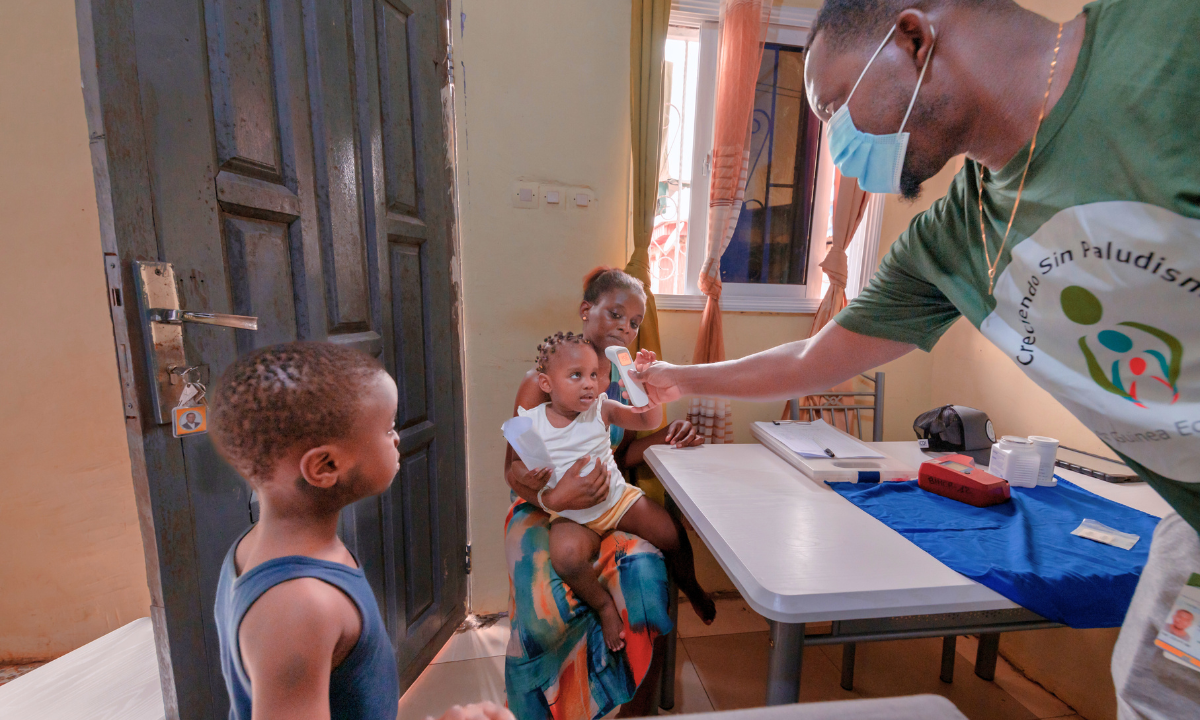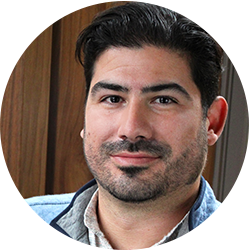Equatorial Guinea Announces Vision 2030 Malaria Elimination Strategy
September 22, 2025

BIMEP staff member takes a baby's temperature as part of gathering health data on Bioko Island.
Launch Event During United Nations General Assembly to Formalize International Partnership Coalition.
The Ministry of Health, Social Welfare and Health Infrastructure of the Republic of Equatorial Guinea announced its Vision 2030 strategy for malaria elimination. The official launch event will take place on September 24, 2025, during the United Nations General Assembly (UNGA) in New York City.
Vision 2030 builds on more than 20 years successfully implementing malaria elimination efforts through MCD Global Health’s (MCD) Bioko Island Malaria Elimination Project (BIMEP). The project has reduced malaria transmission on Bioko Island, Equatorial Guinea, by 78% and has eliminated two major mosquito vectors. Under the leadership of Vice President H.E. Teodoro Nguema Obiang Mangue, the strategy integrates technologies to position Equatorial Guinea as a regional leader in malaria elimination.
Alongside Vision 2030, the Ministry announced the formation of a National Technical Advisory Group (TAG) for Malaria Elimination, bringing together national and international experts to provide independent, evidence-based guidance on integrating proven and novel tools.
"Equatorial Guinea's commitment to malaria elimination represents our dedication to protecting every citizen's health and well-being," said Minister of Health, Social Welfare, and Health Infrastructure, H.E. Mitoha Ondo'o Ayekaba. "The TAG ensures we combine our proven traditional approaches with cutting-edge innovations in the safest, most effective manner possible. This is not just about eliminating malaria; it's about demonstrating African leadership in global health innovation and setting an example for the continent. We are proving that with political will, strong partnerships, and scientific excellence, African nations can lead the world in solving our most pressing health challenges."
During the September 24 UNGA event, the Ministry will formalize partnerships with Oxford University, Tsinghua University, the University of California Malaria Initiative (UCMI), and MCD.
Oxford University, the developer of the R21 vaccine, will lead vaccine elimination studies, supported by Serum Institute of India, the manufacturer of the vaccine.
“The new R21 malaria vaccine has unprecedented high efficacy against malaria and has been safe in both trials and programmatic deployment in large numbers of individuals in Africa,” said Professor Sir Adrian Hill, director of the Jenner Institute at Oxford University. “We look forward to again working closely with the Serum Institute of India in the planned new, large-scale assessment of the R21 vaccine, along with other control tools, on Bioko Island, aiming for elimination of malaria. This intervention will help demonstrate how best to add malaria vaccines more widely into elimination programs in the future.”
“Equatorial Guinea’s Vision 2030 malaria elimination strategy represents a bold and inspiring example of leadership in global health. By bringing the R21 malaria vaccine into this effort, we are confident that science and collaboration can help achieve what was once thought impossible, eliminating malaria and protecting future generations from this devastating disease,” said Adar Poonawalla, CEO of Serum Institute of India.
Tsinghua University will lead the implementation strategy in the mainland region of the country, applying proven malaria control interventions and strengthening district health systems.
"Tsinghua University is deeply committed to this partnership and honored to contribute China's extensive expertise in malaria elimination and health system strengthening,” said Dr. Kun Tang, associate professor at Tsinghua University’s Vanke School of Public Health. “Our strategy for the continental region is rooted in a commitment to sustainability and local ownership while integrating China's proven approach with the valuable lessons from the BIMEP. We will work hand-in-hand with national and district health authorities to combine these strengths with robust community engagement and advanced data systems tailored to the mainland context. Our goal is not only to reduce the malaria burden, but also to equip Equatorial Guinea with the lasting capacity to achieve and maintain elimination, ensuring healthier futures for all communities."
UCMI, a not-for-profit research collaboration, will use its expertise in developing advanced malaria control tools and strategies to ensure that Equatorial Guinea benefits from the latest scientific developments and best practices in full alignment with national priorities and community engagement.
“We are pleased to partner with the Government of Equatorial Guinea in their pioneering malaria elimination program," said Dr. Gregory Lanzaro, a professor in the Department of Pathology, Microbiology and Immunology and founder and chief of the Vector Genetics Laboratory at the University of California, Davis. "Our mission is to support countries in achieving malaria elimination through responsible science, deep collaboration, and genuine community engagement. Together, we can help build a future where malaria is no longer a threat to families and communities across the region."
MCD, a nonprofit global health organization that has spearheaded the BIMEP since 2004, will continue its leadership role by coordinating key Vision 2030 partnership initiatives and serving as the technical secretariat.

"Through our long partnership with Equatorial Guinea, we have demonstrated significant impact on malaria epidemiology and public health," said Guillermo Garcia (image at right), director of International Programs at MCD. “The results with BIMEP on Bioko Island and the strong public-private partnership has shown what political leadership and sustained commitment can achieve. Each setting has its own challenges and requires tailored approaches, but both build on everything we've learned about effective malaria control. Now, under the vice president's visionary leadership, we are better positioned to achieve elimination where it's feasible.”
The launch of Vision 2030 and the TAG underscore Equatorial Guinea's role as a regional leader and global model for malaria elimination. The Government of Equatorial Guinea is committed to ensuring that its journey toward malaria elimination is grounded in scientific excellence, transparency, and the active participation of local communities.